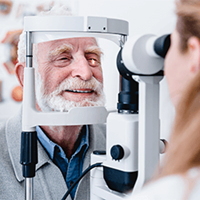What Is Central Retinal Artery Occlusion?
Central retinal artery occlusion (CRAO) is an eye condition where the central retinal artery, which supplies blood to the retina, becomes blocked, leading to sudden and severe vision loss. This blockage can be caused by a blood clot or other obstructions and results in the deprivation of oxygen and nutrients to the retinal tissue. At Retina Associates of St. Louis, our specialists are experienced in diagnosing and managing CRAO to help preserve vision and eye health. If you're in St. Louis, MO, and experiencing symptoms of CRAO, such as sudden vision loss or visual disturbances, it is crucial to seek immediate medical attention.
Reviews
How Is CRAO Treated?
CRAO is a medical emergency that requires prompt treatment to restore blood flow to the retina and prevent permanent vision loss. Various approaches may be used depending on the timing and severity of the occlusion. Immediate treatments can include ocular massage to dislodge the blockage, medications to lower intraocular pressure, and hyperbaric oxygen therapy to enhance oxygen delivery to the retina. Additionally, managing underlying conditions such as hypertension, diabetes, and cardiovascular disease is crucial in preventing future occlusions.
What Are the Symptoms of CRAO?
CRAO causes sudden, severe vision loss in one eye.
- Sudden, painless vision loss in one eye
- Complete or partial loss of vision in the affected eye
- Dark or gray area in the central visual field
- Possible history of eye redness or discomfort (in some cases)
If you experience these symptoms, seek immediate medical attention.
CRAO FAQ
Can CRAO affect both eyes?
While central retinal artery occlusion (CRAO) typically occurs in one eye, individuals with certain systemic conditions, such as cardiovascular disease or blood disorders, may face a higher risk of experiencing CRAO in both eyes. It is crucial to address the underlying causes of CRAO to reduce the risk of it affecting the other eye.
What are the warning signs of CRAO before vision loss occurs?
In some cases, CRAO may be preceded by transient episodes of vision loss, known as amaurosis fugax, where vision temporarily dims or disappears. These episodes can last for seconds or minutes and may signal an impending blockage. If you experience these symptoms, seek immediate medical attention to prevent permanent vision loss.
Are there lifestyle changes that can reduce the risk of CRAO?
Yes, making lifestyle changes to address underlying health conditions can help reduce the risk of CRAO. This includes managing high blood pressure, controlling diabetes, avoiding smoking, and maintaining a healthy diet and regular exercise routine. Regular check-ups with your primary care doctor and eye specialist are also essential for monitoring overall health and preventing occlusions.
Preserve Your Vision
If you're experiencing sudden vision loss or visual disturbances, it could be a sign of central retinal artery occlusion. At Retina Associates of St. Louis, our team of specialists is ready to provide the urgent care needed to address this serious condition. We are dedicated to helping you preserve your vision and manage your eye health. Don't wait — contact us in St. Louis, MO today to schedule a consultation and explore your treatment options.





